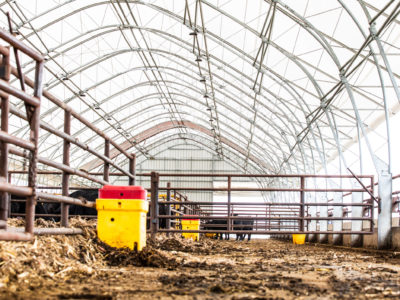Manure Management: Doing the Simple Things First
07-29-2016 in Cattle
When it comes to manure, doing one thing to improve management practices is better than doing nothing at all. The “Manure: Your Fertilizer Source Workshop”, sponsored by the Coalition to Support Iowa’s Farmers (CSIF), provided the tools and know-how to apply simple on-farm manure management practices.
Farmers and agribusiness professionals from across the state attended the first-of-its-kind event held at the Comfort Inn in Dyersville on Wednesday, July 6. They were welcomed by experts in the fields of manure handling, nutrient cycling and water quality.
Greg Brenneman, Iowa State University Extension and Outreach, introduced a fresh perspective on manure variability in his presentation on calculating manure value from different types of livestock facilities.
Opening with the question, “what’s manure worth in your operation?”, Brenneman highlighted the financial gains of utilizing nitrogen, phosphorus and potassium available in distinct fertilizer sources such as open feedlots and pitted barns.
“There may not be gold in the spreaders, but there is value in those nutrients that we’re putting on the field,” he said.
In addition to his manure-by-the-numbers analysis, Brenneman also reminded the workshop participants of the importance of uniform application, precise spreader calibrations and following separation distances from water sources such as streams and creeks.
“This is something we cover on manure applicators’ certification every year, but it doesn’t apply just to the larger operations, said Brennamen. “It applies to everyone.”
Chad Ingels, farmer and manure management plan provider, continued the theme of livestock rules and regulations by outlining the step-by-step process for establishing a sound manure management plan. According to Ingels, one of those steps involves paying attention to collected data.
“As we go to plan which fields we’re going to put it [manure] on, we need to control our data,” said Ingels. “We need to understand what our fields need agronomically for nutrients.”
Another area of emphasis Ingels touched on included the value of documenting when and where manure is being handled.
“Even if you don’t have a manure plan, just document what you’re doing,” he said. “Have that notebook, and document things about manure and not just about crop production.”
The success of today’s livestock farmers depends not only on their compliance of rules and regulations, but on their efforts to meet or exceed the unwritten rules, such as building positive neighbor relations.
Kent Mowrer, senior field specialist with the Coalition to Support Iowa’s Farmers, concluded the workshop linking the management of manure with the management of one’s farm image.
“The image that we have on our livestock farms is how we are going to be judged,” said Mowrer. “So when it comes to manure application, we want to keep our livestock facilities and our manure application equipment clean if we can.”
According to Mowrer, communication is also key to building neighbors’ trust.
“First off, if the neighbors don’t have any information they’re going to assume the worst. They may not understand,” he said. “So we want to try to communicate with neighbors, tell them what we’re doing, try to visit with them annually, preferably before the manure application, and help them understand.”
Following the simple steps can mean smart savings for farmers who are proactive about improving their manure management practices. That’s why Dan Andersen, Iowa State University, highlighted advice he and the Coalition share regarding the management of livestock odors.
“When it comes down to what practices you should be thinking about being the most economical right now, my number one choice would still be siting and planting trees around your facility,” said Andersen. “Both of those really make a relatively big impact for a low investment on the front end.”
CSIF is a non-profit organization that assists livestock farmers who want help interpreting rules and regulations, guidance on good site locations for barns, counsel on enhancing neighbor relations and tips on how to protect the environment at no cost. For more information, call 1-800-932-2436 or visit www.supportfarmers.com.
The Coalition to Support Iowa’s Farmers was created by farmers to help farmers raise livestock responsibly and successfully. It’s a joint partnership involving the Iowa Cattlemen’s Association, Iowa Corn Growers Association, Iowa Egg Council, Iowa Farm Bureau Federation, Iowa Pork Producers Association, Iowa Soybean Association, Iowa Turkey Federation and Midwest Dairy Association.
-30-
Recommended News

CSIF to Host Calving Under Roof Open House
WEST DES MOINES, IOWA – June 10, 2022 – The Coalition to Support Iowa’s Farmers (CSIF) is hosting a “Calving Under Roof Open House” at the Laura and Aaron Cunningham farm...
Read More
Iowa Livestock Insider // Winter 2021
Read More
Report Suspicious Vehicles Near Livestock + Poultry Farms
Recently, there have been reports of suspicious vehicles parked along the road near livestock + poultry farms throughout the Midwest, including Iowa. In some instances, people are just taking photos...
Read More